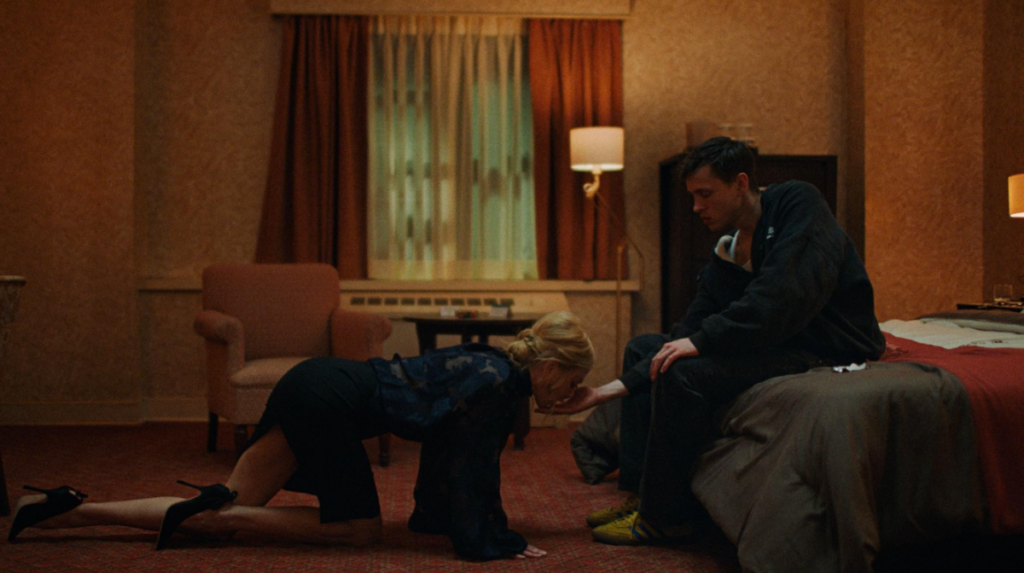“What if the thing that turns you on the most is the thing you’re most ashamed of?”
This is the question at the heart of Babygirl, the latest film from writer-director Halina Reijn, starring Nicole Kidman, Antonio Banderas, and Harris Dickinson. It’s a film that doesn’t shy away from the painful tension between desire and shame, particularly for those whose sexual needs don’t align with traditional, romantic ideals.
Before diving in, it’s important to remember that Babygirl is a movie, not a kink tutorial. Its purpose is to tell a story, to make us feel something, to entertain us. It is not a how-to guide for exploring kink in real life. However, for many people watching, this might be one of the few representations of kink they have ever seen. And that is an important consideration.
Overall, I enjoyed this film. It shines a light on the deep shame many people feel around their kinks and the turmoil they face when trying to accept this part of themselves. It also presents a realistic depiction of how two people might explore kink in the real world, rather than the over-dramatised dungeon stereotypes often shown on the big screen. However, as someone who works in sex education, my concern is that for kink-curious viewers, this film doesn’t exactly set a best practice example for how to explore kink safely and consensually.
(Alert: Spoilers below!!!)
Sex vs. Love
One of the things I loved about this film was how it showed that Romy and her husband Jacob had a beautiful, loving relationship. Their struggles weren’t about a lack of connection or a failing marriage. It was purely about Romy’s sexual fulfillment.
This is such an important distinction, and it’s one we rarely see in mainstream media. We’re often taught that sex and love should be completely intertwined—that if you love someone enough, the sex will work itself out. But for many people, desire is more complicated than that.
Romy’s dominant partner, Samuel, makes this clear when he tells her:
“What we do is like two children playing.” And “It has nothing to do with your work, your family.”
These lines stood out to me because Samuel is highlighting something crucial. Kink doesn’t have to threaten your life, your relationships, or your values. For some people, it exists as a separate space, a “playground” where they can fully explore and express the deepest parts of themselves without it affecting their marriage, parenting, or career.
However, when kink must be explored in secrecy, as it is in this film, it can become devastatingly destructive. Romy’s shame is ever-present throughout the film, and when her husband discovers her affair, the pain is palpable. What I hope viewers understand is that it is the secrecy, not the kink itself that is what causes so much suffering.

The Pain of Shame and Repression
Romy’s shame throughout the film is heartbreaking. At one point, she confesses that she has spent her whole life in therapy trying to “fix” her desires, convinced that she is broken and disgusting.
Sadly, this is all too common. So many people believe their desires are wrong. They think they’re defective because they don’t fit into the standard script of love and intimacy. But the truth is, kink is so much more common than people realise. It can be a fun, healthy, and fulfilling part of life when explored safely and without shame.
By the end of the film, Romy seems to have come to a place of greater self-acceptance. She reunites with her husband, and in a powerful moment, she is finally able to orgasm with him. This suggests that, rather than rejecting her kinks, she has found a way to integrate them into her relationship and feel more assured in her desires.
My Concern with this Film
While Babygirl does not necessarily reinforce harmful stereotypes about kink and BDSM, my fear is that many viewers (particularly those newly exploring their desires) might take away the wrong message.
Romy and Samuel’s dynamic is fraught with secrecy, manipulation, and blurred lines between fantasy and reality. There is no clear distinction between what is real and what is play, and there are no conversations about boundaries. This is especially clear when Samuel visits Romy’s family without her permission and continuously gaslights her by acting as if there is nothing wrong.
There is Samuel, we can all feel the ick!
The most uncomfortable part of the film for me was when Romy and Samuel finally attempt to have a conversation about consent, which quickly descends into blackmail. Samual literally makes Romy promise to do what ever he tells her or he will “tell” about the affair.
Just in case there is any doubt here… This is NOT ok!!! This is also the point where the relationship stopped being sexy for me.
While this may have been an intentional creative choice, perhaps reflecting the fact that neither Romy nor Samuel truly understand how to navigate kink in a healthy way, the film doesn’t offer a model for safe, fulfilling exploration.
For kink-curious viewers, this could send the message that secrecy and chaos are the only ways to explore their desires. And for those who don’t understand kink at all, the film might reinforce the idea that it is inherently destructive, rather than something that can be deeply fulfilling and positive.
Kink can be so wholesome, why do we never see that on screen?!

The Hypocrisy of “Be Yourself”
One of my favourite moments in the film was the subplot about Romy’s company launching a new product, with branding focused on vulnerability, authenticity, and being yourself.
And yet, when it comes to sex and kink, none of those values seem to apply. Romy’s life is literally being torn apart because she cannot be herself.
This moment hit hard because it highlights an ever present truth – society loves the idea of authenticity, but only when it fits within certain norms. If your truth happens to be something unconventional (like needing dominance and submission to feel sexually fulfilled) suddenly, authenticity is no longer celebrated. Instead, it becomes a source of shame.
Final Thoughts
Overall, I’m glad this film exists. It opens up a conversation that desperately needs to be had, and Nicole Kidman delivers a stunning performance. It ends on a hopeful note, with Romy and her husband finding their way back to each other and her becoming more assured in her desires.
However, I walked out of the cinema feeling deeply conflicted. Looking around, I noticed the audience and wondered how many of them might be kink-curious, sitting with their own hidden desires, wondering if they, too, were broken.
I found myself wishing I could hand out my business card to every single one of them, just so they’d know:
“Yes, it’s okay to explore your secret desires… but you don’t have to do it like this.”



